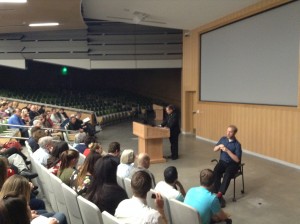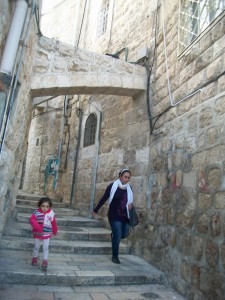The Vatican representative to the United Nations said religious freedom’s decline requires the international community to defend religious minorities at a conference on Mormons and Catholics at UVU April 13.

His Excellency Archbishop Bernadito Auza, permanent observer of the Holy See to the United Nations, gave the keynote address for the conference. His address was titled “Religious Freedom in the Twenty-First Century” and included an overview of religious persecution worldwide and how Catholics and Mormons cooperate.
“Persecution against Christians today is actually worse than in the first century, and there are more Christian martyrs now than there were,” Auza said.
Auza said religious freedom is on the decline in every part of the world, although particularly in the Middle East and North Africa and some dictatorial regimes. He said the persecution of religious minorities has grown so intense that where governments can’t or won’t stop it, the international community must. He said using military force to “protect the defenseless” would fit the Catholic description of a “just war.”
Christians are the most persecuted religious group, and the Middle East’s Christian minorities — the oldest Christian communities in the world — are on the verge of extinction in Syria, Jordan and Iraq, Auza said, citing a report released November 2014.
“The Middle East is the cradle of Christianity, while these communities are disappearing in a very rapid manner,” he said. “We have helplessly watched as Christians in Iraq are being driven out of their homes.”
Auza summarized the state of religious freedom with three points: “respect for religious freedom has declined, and its violations have increased in all parts of the world”; the international community has not yet found a way to respond; and believers still remain committed to their chosen religion.
America has been a beacon of religious liberty and the virtue that must accompany liberty, Auza said. He quoted George Washington, John Adams and others, although he is Filipino. Despite these freedoms, both Catholics and Mormons have experienced with religious persecution, even in recent American history.
“Had Mormons received even fleeting tolerance from the 1820s on we likely would not be meeting here,” Auza said. “But possibly in Haun’s Mill.”

Mormons and Catholics in America have experienced persecutions in form of the martyrdom of Joseph Smith, violent discrimination by the Ku Klux Klan and unusually intense scrutiny of John F. Kennedy and Mitt Romney as presidential candidates, Auza said.
“Because we did not always find a welcome mat we needed in the crucible to learn how to make others feel welcome, especially those in need,” Auza said.
He identified four areas where Catholics and Mormons have found common ground and can keep working together: family, education, charity for the needy and the necessity of “living and sharing our faith publicly.”
BYU professor of Islamic studies Daniel Peterson has worked with officials at the Vatican and thinks the cooperation between Catholics and Mormons should increase, given the many attacks on Christians from both secular and extremist sides.
Peterson cited Benjamin Franklin’s quote with reference to religious people, “If we don’t all hang together we shall most assuredly hang separately.”
“If we don’t band together then we’re just easier to pick off,” Peterson said.
Peterson said although many consider the involvement of The Church of Jesus Christ of Latter-day Saints in the 2008 controversy over Prop 8 as “a disaster,” it increased friendship between Catholics and Mormons. He said events like this and Cardinal Francis George’s 2010 visit to BYU is evidence of this.
“That would have been unthinkable 10 years ago,” he said.
Matthew Franck, a visiting lecturer at Princeton University, is Catholic and will be presenting at the same conference on Wednesday. He said he was glad to have heard the address and joked he will change his presentation based on what he heard.




